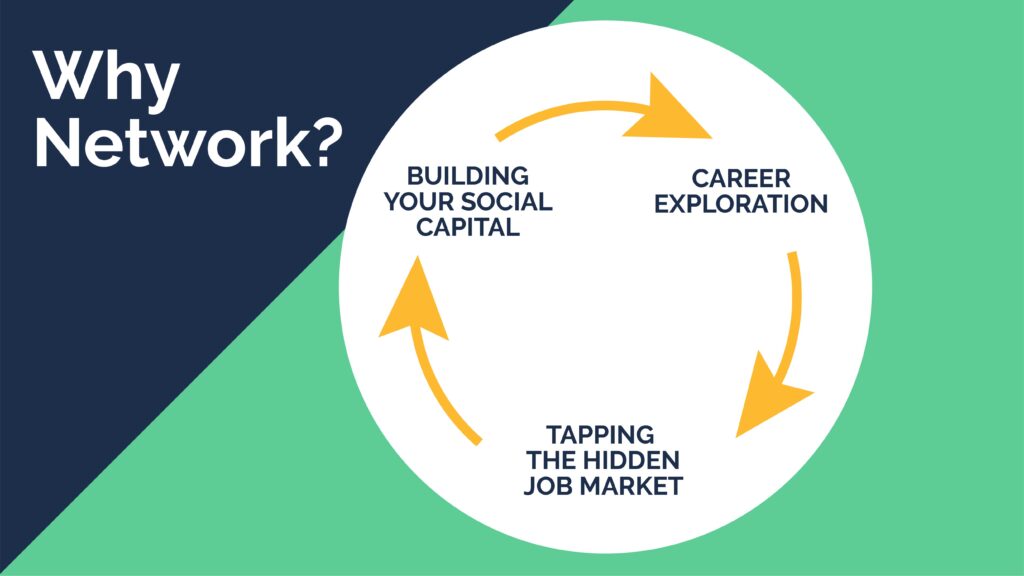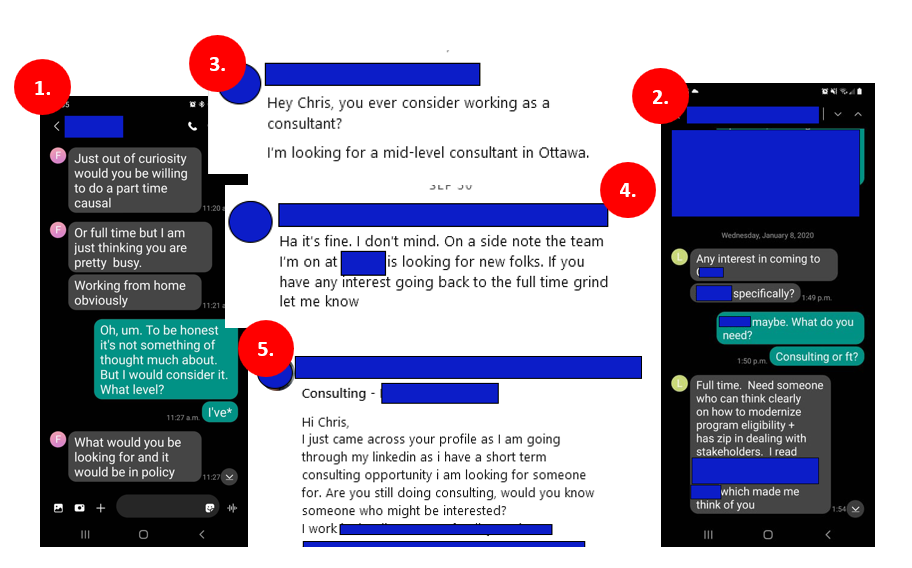Updated January 23, 2023
Building your network is a must. It’s honestly the MOST important thing I’ve ever done to advance my career.
More and more people are realizing this all the time, but a lot of people still don’t know WTF networking is. They’re at a loss for HOW to network.
We still think of networking as this awkward thing done by — well, let’s be honest — dudes in suits at cocktail parties. But I’m here to say, this is crap.
So to everybody who’s told me:
- That’s not my style.
- I’m just no good at it.
- I’m not that type of person.
- I don’t do well at those events (yeah… less than five percent of my networking is done by showing up to event.)
I’ve got news for you. Networking is not as hard as you think. Throwing your resume on a stack of a thousand other applicants will not get you hired. Networking will… And yes, you, can Network.
Here’s 11 tips on how to network like a CEO.
- Why you need to know how to network
- How to network like a boss
- Read More:
Why you need to know how to network
A lot of people think that networking is like an *extra* thing in your career. They treat networking like it’s for people near the top, or for those in really outgoing careers — like politicians.
The thing is, networking does three basic things.
- First, when you don’t know what career you want or your next job step, it helps you explore. You can meet with people and hear about their jobs without ANY expectations. Just learn.
- It helps you uncover opportunities that you wouldn’t otherwise know about. AKA The hidden job market. (I’ve gotten a lot of jobs this way).
- It increases your social capital, meaning helping you grow the number of people who respect you and want to help you.

If you’re not convinced, let me just add this part. JOBS COME TO YOU! Seriously, people will come and ask you to work for them once you build a powerful network. That’s probably the best part. Here are some of the requests I’ve gotten over the years. A few of these paid over $100k!

How to network like a boss
1. Start with the people you know
I love reaching out to strangers. I do it all day every day.
But if you are just getting started, and you don’t have the confidence to do that yet, start with the people you know.
I guarantee that you already know some people doing interesting things. Go take stock of who that is and talk to them!
2. Stop attaching your resume
When you send a message to somebody, whether it’s somebody that you know or somebody you would just like to have a conversation with, do not, I repeat, DO NOT, attach your resume.
This is a rookie mistake.
As a matter of fact, I personally never give a resume unless directly asked for it.
You need to change your thinking about networking. It’s a little bit like dating. You don’t go in for the kiss right after the handshake. You don’t ask somebody to marry you on the first date.
And with networking too, you need to ease your way into it.
Start by shifting your focus, especially if you’re job searching. Instead of imagining that every person you talk to is going to get you a job, focus more on trying to learn.
This means sending them a message asking if you can learn from them, rather than sending a resume asking for a job.
You will find that people are way more receptive to this approach and, paradoxically, it’s much more likely to actually lead to a job.
But there’s an exception here! If you’re meeting with someone for networking but it’s specifically connected to exploring an open role, by all means, send it… AFTER you meet. As long as you both went into the networking session knowing the convo was about the role. Otherwise, you could send a message like, “Hey, I saw there’s an open role… can I send you my resume for it?”
3. Tell people why you want to connect
When you are reaching out to people, especially if you are reaching out to people cold, tell them why you are interested in connecting.
If you send a LinkedIn message, for example, and tell somebody that you are curious about getting into their industry and would like to know more about what they do, you are much more likely to get a response than if you simply send a connection request out of the blue with no context.
4. Talk to your profs
Most of the readers of Roostervane are students or recent graduates, and if this is you, you should start by talking to your professors. Many professors have networks outside of college that they can draw on, and some may be able to introduce you to some interesting people.
Now I know that there’s a lot of stigma around non-academic work in some departments. I have written whole blogs on it and why it makes leaving academia hard (especially for those with advanced degrees).
So if you are working with for studying under a professor who has absolutely no time for non-academic work, you might have to search a little harder.
But I guarantee you that somewhere at your university is the person you seek. Consider courses you’ve taken in the past, in any discipline, with profs who do interesting things and might have great connections outside of the university that you can draw from.
5. Put your best foot forward
You wouldn’t believe the amount of time I spent agonizing over my LinkedIn profile. Do I portray my skills well? Do I look like a leader or just a kid who has no clue? Do I sound interesting, or do I just look like another student? Do I look like an academic?
You can’t completely control what people think of you. But controlling your image online goes a long way.
Why do you think companies hire Public Relations people? Because they know, instinctively, that you can’t perfectly control your image, but you can work to craft it.
Become your own PR person.
Create an online presence that portrays professionalism and demands to be taken seriously.
I’ve got some ideas for how to do that here.
6. Mimic other people
If you were reading the last point and not really sure what this type of professionalism actually looks like, you can always take clues from how other people present themselves.
Go and look at your LinkedIn.
Then look at a bunch of other people’s profiles. (You can search your skills or credentials in the search bar and hit “People” to find people with similar skill sets.)
What stands out? What catches your attention? Can you adapt your profile to reflect those ones?
I do the same thing when I am communicating with people.
Copy the tone that people use in their correspondence.
If people are short, abrupt, you can mimic that.
Yes, like me and much of my generation, sometimes the people you are talking to enjoy the frequent use of exclamation marks. Mimic that!
7. Don’t beg
If you are reaching out to people and asking if you can have some of their time to learn about what they do, present yourself as an equal.
Do not act like a supplicant approaching a deity.
Don’t beg.
You are not a pimply-faced kid asking the popular boy to your slumber party or your birthday party. You are making a reasonable request for a bit of their time. If they can’t give it to you, then they will feel no qualms about saying no.
Either way, it’s not an indictment of your value, it’s usually simply a reflection of how much time they have to give.
Oh yeah, DO NOT, I repeat, DO NOT, apologize for “wasting their time.”
It’s a simple psychological trick, but if you present yourself as their inferior they are less likely to take the time to talk to you, or to see it as a mutually beneficial conversation.
8. Be really bold
So I talked about how networking doesn’t have to be scary, but let’s put that fear aside for a minute. Let’s imagine what fearless networking would look like.
Let me tell you about one of my friends who is a master networker.
In Ottawa, there are lots of receptions (when there’s not a pandemic on). These are put on by lobbying groups and politicians, who use them as an opportunity to schmooze and build connections. I have a friend who used to put on a suit on and go to every single one of these he possibly could.
He didn’t know anybody. He would walk in and stand tall and meet people.
Apparently, he even went so far as to buy a cheap airline ticket and go and sit in the lobby of the airport. On Friday afternoons, when the politicians fly home from Ottawa, he was there meeting people. Not surprisingly, my friend is now a well-connected lobbyist who gets texts from politicians on the weekend.
I’m not as gutsy. And I’m not a lobbyist. But using this strategy did once land me as one of a couple of commoners at a party made up of a bunch of Canada’s cabinet ministers–that’s a different story.
Yes, there are lots of ways to build a network that are less scary.
But sometimes massive action delivers massive results. If you want to take your networking to the next level, make fear your friend. Tame the butterflies in your stomach, and get serious about this. Fortune favors the bold.
Lindy Ledohowski, who is the CEO of the ed-tech startup EssayJack, told me the story when I interviewed her about what happened when she left a tenure-track English professor job and had to start again. She dropped into every place in town where she might possibly meet people and crafted a consulting career for herself by meeting strangers.
So try some stuff. Drop in places. Strike up conversations. The braver and bolder you get, the more results you may see.
9. Go to conferences and events
I first wrote this post during the pandemic. But hey! Events are back, baby! Use them like a boss.
Apparently, on any given weekend, there are dozens of conferences in my city of Ottawa. If you are close to a major city, the same is likely true for you.
Go grab some conferences. But don’t go sit in the plenary. Hang out in the lobby. I’ve met lots of interesting people at conferences, and it almost never happens during a session.
Sit next to somebody at a table and introduce yourself. Be fearless and ask lots of questions. Last time I did this, I ended up spending an hour talking to the founder of a major think tank.
10. Accept that networking is a game
Remember the first time you played Monopoly? Or poker?
The person who invited you to play probably knew the rules way better, you felt like an idiot, made a lot of mistakes, and ended up totally losing.
While it’s impossible to totally lose a game of networking, I think, networking is like any other skill. You get better at it as you go.
If you want to be a CEO-level of networker, you really need to accept that this is a game. The more you play it, the better you get. The more your network grows, the more it will snowball into powerful and interesting connections.
So don’t place expectations of world domination onto any individual networking meeting or LinkedIn message.
Recognize that this is a game, and the better you play it, the richer you get. Because, unlike Monopoly, the money that networking will eventually bring you can be used to build a real life. And to buy houses and hotels.
11. Think beyond jobs
Most of the first people you will start networking with will probably be in an attempt to get a job.
This is pretty normal for people first coming out of a degree.
But one of the great things about this fact that you are informational interviewing and not just job-hunting is that networking will give you way more than just jobs.
Do you want to start a company?
Have a network of people who can advise you, support you, connect you, and fund you.
Do you want to start Consulting?
Have a list of people who know you, like your work, and will hire you.
In the game of life, networking can be used for so much more than just job searching, and people who network like CEOs understand this. This is the most important of all of the tips on how to network. The first person you network with might not hire you, but who knows, five years later they might invest in your startup.
Build a big powerful network, and keep an open mind about what it’s for. Then watch what you can do with it.
Now Read: 3 Tricks Leaders Use to Get a Job Without a Resume (Video)
More Articles on Building Your Network
10 Powerful LinkedIn Tips to Take Your Networking Game to the Next Level
Is Networking Important? In short, Yes! Here’s Why It Will Dramatically Change Your Career






